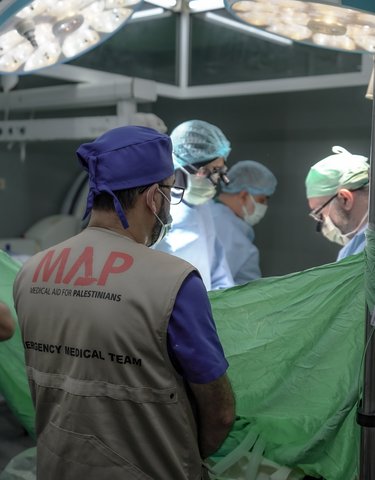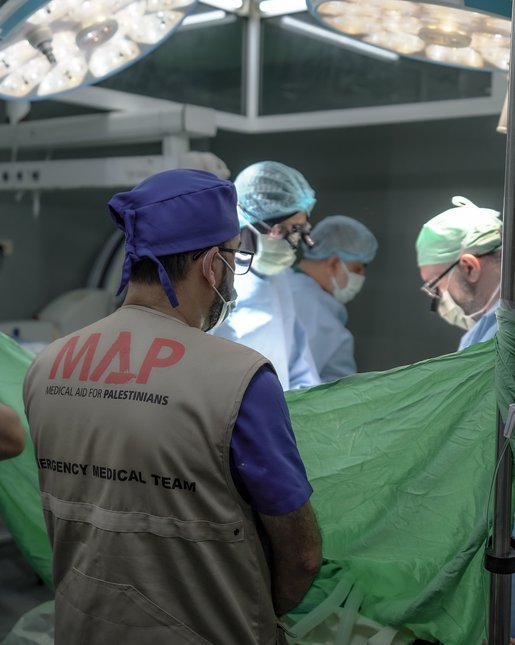New MAP-supported unit transforms breast care in the West Bank
6 October 2022
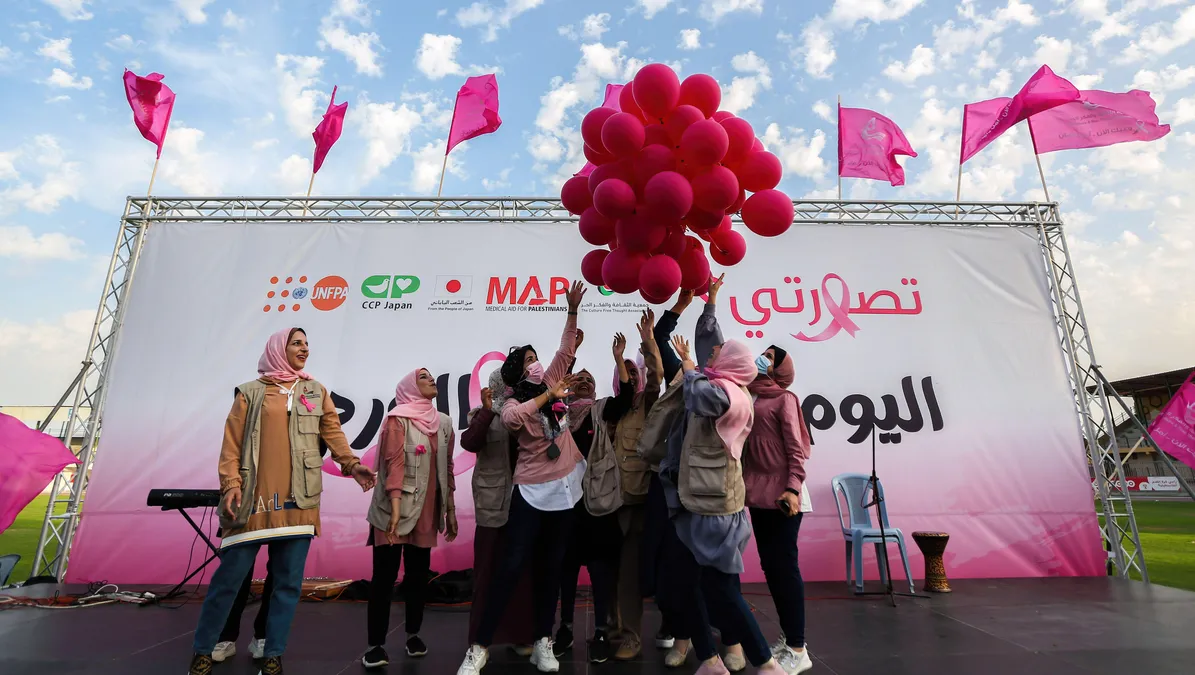
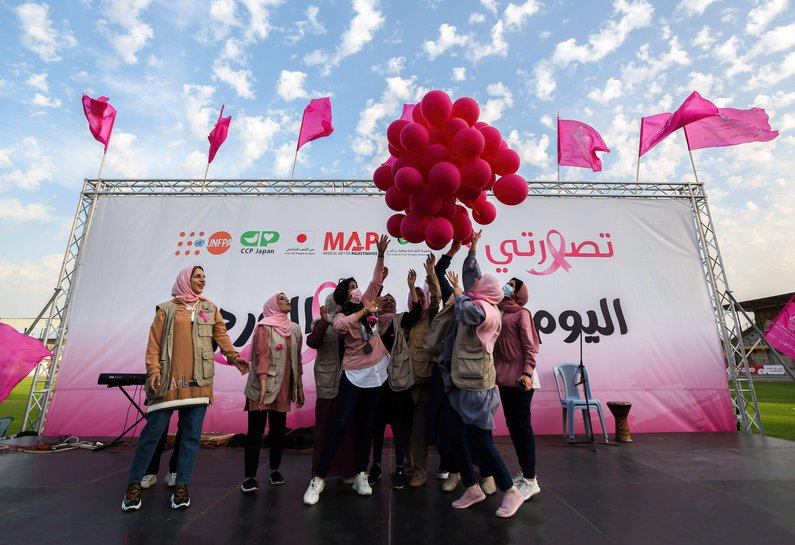
The unit has been refurbished and equipped with the most advanced medical devices and has so far served more than 200 patients since becoming operational in May 2022. “There has been a transformation in how we deliver breast care services,” said Shifa, a nurse at the unit.
“Before this unit opened, services were spread out in different places. A woman coming for services would have to go to one place for an ultrasound, another place for a mammogram and somewhere else for a biopsy. It was very difficult for women to navigate this. Now all the services are delivered in a one-stop unit, so the experience is much easier for women. The process is clear and the women coming to the unit feel more comfortable.”
Breast cancer is the most common cancer among Palestinian women in the West Bank and accounted for 32% of all cancer cases among women in 2020. But restrictions on freedom of movement for both patients and healthcare workers, shortages of essential medicines, and the fragmentation of the health system in the occupied Palestinian territory (oPt) are major obstacles to effective treatment and care for Palestinians with breast cancer.
An official opening of the new unit was planned for the beginning of Breast Cancer Awareness Month, on Sunday 2 October. But due to a significant increase in military raids and violence by Israeli forces and settlers in Nablus, and across the West Bank, travel to Rafidia Hospital was not possible and the official opening was postponed. MAP and the Palestinian MoH will confirm a new date for the opening of the unit soon.
“Women feel that they are treated with dignity here”
Fifty-two-year-old Yafa* was diagnosed with breast cancer in 2019. Due to the fragmentation of breast cancer services in the West Bank, she previously needed to travel far and across checkpoints to access different diagnostic and treatment centres.
“I had to seek medical attention at Rafidia Hospital, have an ultrasound in An Najah Hospital, do a mammogram in a private clinic, and do an MRI or CT scan in Jenin hospital,” said Yafa. “I had a very long journey to diagnosis. There was no medical centre that has all the machines in one place. It was extremely exhausting to keep going from one medical centre to another.”
In August 2019, Yafa suffered from new pains in her breast. She had a biopsy and a mammogram, and her doctor advised that an upcoming MAP-supported mission of UK breast cancer surgeons should review her case. The UK mission seconded the doctor’s diagnosis and identified a malignant tumour.
“When I heard the news, this was my first time crying on the phone while talking to my husband,” said Yafa. “Even though I already had an exhausting journey of surgeries before, this time it was a real vicious cancer.”
With the new breast unit, I can have an ultrasound, a mammogram, surgery, consultations and follow ups all in one location. You have no idea how this has made our lives so much easier.
The visiting surgeons, alongside their Palestinian counterparts, have since operated on Yafa twice and removed her tumours. She was then referred to Augusta Victoria Hospital in occupied East Jerusalem for radiotherapy, as it is the only place where this treatment is available in the entire oPt.
Israel’s discriminatory policies mean that, as a Palestinian with a green West Bank ID, Yafa must obtain a permit from Israeli authorities to cross the separation wall and access health services in East Jerusalem. She eventually managed to receive a permit in December, after applying in August, but by that time, Yafa’s doctor told her that the second surgery managed to destroy the cancer cells and she would not need to have radiotherapy. “I felt so relieved that I won’t be going through the journey of traveling to East Jerusalem and having to apply for a permit for each medical appointment at the hospital,” said Yafa.
Now, Yafa must take chemotherapy pills, have an ultrasound every three months and a mammogram every year. “With the new breast unit at Rafidia Hospital, I can have an ultrasound, a mammogram, surgery, consultations and follow ups all at the same unit, in one location. No more long journeys between cities and medical centres. You have no idea how this has made our lives so much easier,” said Yafa.
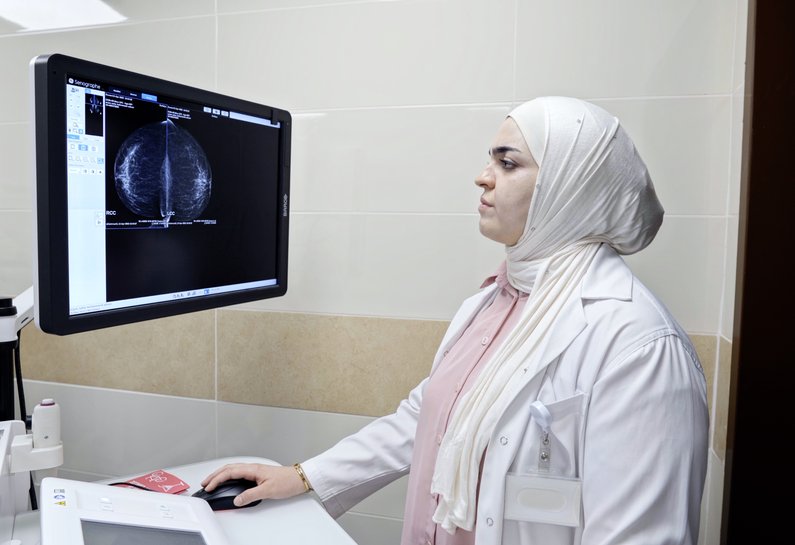
The new unit has been refurbished and equipped with the most advanced medical devices thanks to MAP's supporters. (Credit: Ark Media/MAP).
On top of the physical pain of Yafa’s treatment journey, the psychological impact was just as significant. “I never had any support for my mental health or wellbeing. I learnt how to cry on my own and how to hide my feelings from others,” said Yafa.
“I never even thought to talk to someone other than the women who were undergoing a similar journey. I used to meet them after surgery or while waiting in the queue for a mammogram. They became my friends and my support group. Seeing others who feel your pain makes it easier to endure.”
“My message to other women is that your mental health is two thirds of your treatment. Keep your hopes high and don’t let fear conquer your thoughts. I decided to fight this on my own as I find it easier than having to also battle with other people’s feelings about it. But my husband was also supportive, and I am lucky.”
Yafa is now receiving medical and psychological support from nurse Shifa at the new MAP-supported breast unit. “Nurse Shifa is like a sister to us”, said Yafa.
Nurse Shifa also highlighted the importance of looking after the wellbeing of patients: “The most important change is how the women feel when they come to this new unit. The unit is bright and modern and feels very different from the surgical wards in the older part of the hospital, where we used to serve these patients. Women feel that they are treated with dignity here.”
“I would like to thank MAP and all of their supporters for their work in setting up this unit,” she added.
Please donate to MAP's work supporting Palestinian breast cancer patients today.
Photo: Palestinian women during the Pink Sports Day at a campaign aiming to support breast cancer survivors during “Pink October”, in Gaza City. (Credit: SOPA Images Limited/Alamy Live News).
*Name changed to protect identity.
